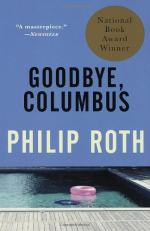|
This section contains 723 words (approx. 3 pages at 300 words per page) |

|
On the range of literary criticism, Philip Roth has been targeted by Jews and Gentiles, literary authorities and laymen, as an exploitative, narrow-minded reinforcer of Jewish stereotypes; a writer who is dedicated to portraying, as one Rabbi editorialized several years ago in the New York Times, "a melancholy parade of caricatures." Some have even attacked his works as dangerous, dishonest, and irresponsible. Roth has rebuked these accusations from the time he was made famous in 1959 by Goodbye, Columbus, a novella and group of short stories about which Roth explained his use of Jewish characters and lifestyles as simply vehicles to portray universal themes. Many claimed Roth had depicted in this book the quintessential negative portrait of Jews and Jewishness.
In an essay for Commentary, ("Writing About Jews," Dec. 1963), Roth countered such assessments of this and subsequent books by saying of his critics:
Not only do they seem to...
|
This section contains 723 words (approx. 3 pages at 300 words per page) |

|


